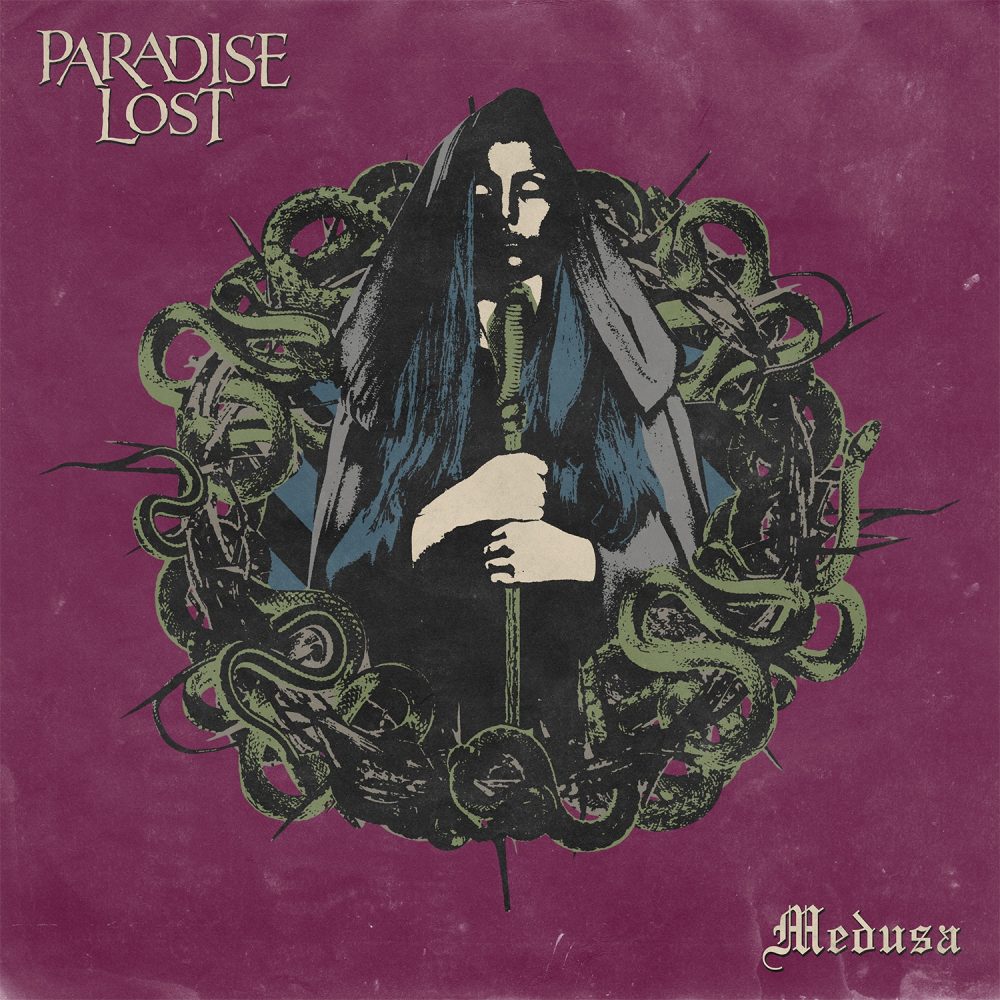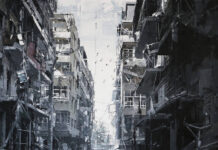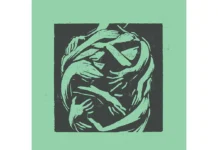I’ve been a fan of Gothic doom pioneers PARADISE LOST for about 7 years now. Their discography is one of the most interesting in the history of metal, ranging from death/doom to synth-tinged Gothic pop. While fan-favorite “Draconian Times” (1995) is my favorite album as well, I also love the controversial “Host” (1999), which left metalheads scratching their heads in disbelief, and therefore almost all the different phases of the band’s career have something to offer to me. PARADISE LOST have gradually returned to a heavier sound, and “The Plague Within” (2015) finally brought back the death growls heard on the band’s first few releases. “Medusa,” the first PL album through Nuclear Blast, will be released on September 1st, and it builds upon the doomy direction of the “Plague” track, “Beneath Broken Earth.”
Scroll down to read in Finnish.

Although I didn’t like “The Plague Within” as much as its three predecessors, and in some parts of the songs, the growls felt like a cop-out when clean singing would’ve been more appropriate, it was still a quite solid album and didn’t abandon the melodic sensibilities that the band had developed over the years. Despite that, I wasn’t totally sure what to expect from “Medusa,” as the band had described it as a sludgy album and the missing link between “Gothic” (1991) and “Shades of God” (1992). I’m not really into sludge metal, and to me “Icon” (1993) is the first album in which PL truly hit their stride, so the first three albums aren’t exactly close to my heart. While the first two singles showed a lot of promise, it turns out that my concerns about “Medusa” were not unfounded – the growling has become even more predominant, a lot of the songs are at similarly slow tempos, and sadly PL‘s trademark hooks, melancholy, and atmosphere aren’t very prevalent.
Let’s start with the good: the 8½-minute “Fearless Sky” is the longest PARADISE LOST song ever, but it flows very well compared to, say, “Crying for Eternity” from “Shades of God.” The Hammond organ (an instrument the band has never used before) intro sets the mood nicely, and the SABBATH-y riff after the 6-minute mark is a good one, although the song could do with more melodic vocals in the first half. The lead single, “The Longest Winter,” is the strongest tune here, with a soaring chorus, a TYPE O NEGATIVE vibe (never a bad thing!), and a cool guitar effect that almost sounds like a keyboard. The title-track includes haunting piano, Nick Holmes‘s vocal melodies are interesting, and the clean guitar in the middle is nice. “Blood and Chaos,” the second single, is a “Draconian Times” -style upbeat track that’s a breath of fresh air from the doominess of the rest of the album, although the murky production and growling don’t really fit it. In that sense it’s like “Cry Out,” the most rocking tune on “The Plague Within.”
Then comes the bad: “Gods of Ancient” is one of the most forgettable PL songs ever with its pedestrian doom riffage, while “No Passage for the Dead” tries to recapture the “evil” vibe of the band’s debut, “Lost Paradise” (1990), and lesser Gothic tracks like “Rapture” and “Silent.” “Until the Grave” is a rather underwhelming ending to the record compared to previous album closers such as “The Glorious End” and “Over the Madness.” “From the Gallows” is the most frustrating track of all, as it begins with a promising melodic intro, but quickly descends into standard death/doom, sounding like a poor man’s “Dead Emotion.” According to lead guitarist and composer Greg Mackintosh, the song has its origins in 1989 – if it wasn’t good enough for a studio album back then, why was it worth recording now?
When it comes the production, I have to say I’m not a big fan of the buzzsaw death metal tone of the guitars, because it makes Aaron Aedy’s rhythm guitar tracks sound less tight than they should be. The drum sound is also very similar to that of “The Plague Within,” which I believe hinders the album’s own identity a little bit. Speaking of drums, the young Finn, Waltteri Väyrynen, makes his debut behind the kit on “Medusa.” He does a good job, managing to throw in some nice fills despite the general slowness of the music – too bad his youthful energy didn’t spark the band to make stronger songs. Nick Holmes‘ vocal performance is unfortunately a little one-dimensional, as his Hetfieldish rasp is absent, which only leaves us with growling and clean crooning. It’s a shame, because at many points throughout, a gritty yet melodic approach could’ve done more justice to the material than simply growling his way through it.
I’m afraid I can’t shake off the feeling of a musical midlife crisis while listening to “Medusa.” PARADISE LOST is like an uncle who used to be naturally cool, but has now bought a Harley Davidson and is trying too hard to act like a badass. Considering that the gap between the two newest albums was merely 2 years, instead of the typical 3, and that Greg Mackintosh wrote the music while working on the latest VALLENFYRE record, I think taking more time might have done wonders considering how rushed the final result sounds. As a big fan, I hate to give the album such a low score, but when you only truly like half the songs, out of which a few could’ve been stronger with changes in the vocal and production department, and the rest is a big blur that fails to convince you even after several listens… well, there isn’t much of a choice. To add insult to injury, bonus track “Symbolic Virtue” is available for listening on Spotify as the B-side to the “Blood and Chaos” single, and it’s a lot better than most of the songs on the actual tracklist – I wish the album had been more in its vein, with mainly clean vocals and a little more keyboards to make things sound more colorful. As is, “Medusa” is a disappointing throwback to PARADISE LOST‘s most embryonic and least mature era that doesn’t play to the band’s strengths. It’s the third real clunker in their otherwise consistent catalog, the first two being “Lost Paradise” and “Believe in Nothing” (2001).
Written by Wille Karttunen
Musicalypse, 2017
OV: 2606 / 1067
Olen ollut goottidoomin pioneerin Paradise Lostin fani jo noin seitsemän vuotta. Bändin diskografia on yksi mielenkiintoisimmista metallin historiassa, vaihtelua kun riittää death/doomista syntikkavetoiseen goottipoppiin. Vaikka fanien suosikki Draconian Times (1995) on minunkin lempialbumini, rakastan myös kohua herättänyttä Hostia (1999), joka sai metalliyleisön edustajat raaputtamaan päitään epäuskoisina, ja näin ollen lähes kaikilla yhtyeen uran vaiheilla on jotain annettavaa minulle. Paradise Lost on hiljalleen hivuttautunut jälleen raskaampaan tyyliin, ja The Plague Within (2015) toi viimeinkin takaisin alkupään julkaisuilla kuullun murinalaulun. Medusa, ensimmäinen Nuclear Blastille tehty PL-albumi, julkaistaan 1. syyskuuta, ja se jatkaa Plague-raita “Beneath Broken Earthin” viitoittamaa doom-linjaa.
Vaikka The Plague Within ei ollut makuuni aivan yhtä hyvä kuin kolme edeltäjäänsä ja joissain kohdin kappaleita murinat tuntuivat turhan helpolta ratkaisulta, kun puhdas laulu olisi ollut sopivampaa, se oli silti melko vahva levy eikä hylännyt bändin vuosien varrella kehittämää melodiantajua. Tästä huolimatta en ollut varma siitä, mitä Medusalla oli odotettavissa, sillä bändi oli kuvaillut sitä sludgemaiseksi albumiksi ja puuttuvaksi palaseksi Gothicin (1991) ja Shades of Godin (1992) välillä. En pahemmin perusta sludge metalista, ja mielestäni Icon (1993) oli PL:n ensimmäinen täsmäosuma, joten ensimmäiset kolme albumia eivät ole varsinaisesti lähellä sydäntäni. Vaikka kaksi ensimmäistä singleä olivat kovin lupaavia, huolenaiheeni Medusasta eivät olleet tuulesta temmattuja – murina on entistä keskeisemmässä roolissa, monet kappaleet kulkevat samankaltaisissa hitaissa tempoissa ja PL:n tavaramerkiksi muodostuneet koukut, melankolia ja tunnelmallisuus eivät ikävä kyllä ole vahvasti läsnä.
Aloitetaan plussilla: 8½-minuuttinen “Fearless Sky” on Paradise Lostin pisin kappale koskaan, mutta sen rakenne on luontevampi kuin vaikkapa “Crying for Eternityn” Shades of Godilla. Hammond-uruilla (soitin, jota bändi ei ole koskaan käyttänyt) soitettu intro luo tunnelmaa hienosti, ja sabbathmainen riffi 6 minuutin paikkeilla on toimiva, vaikka biisin ensimmäisessä puoliskossa voisi olla enemmän melodista laulua. Ykkössingle “The Longest Winter” on vahvin kappale vahvoine kertosäkeineen, Type O Negative -tunnelmineen ja siisteine kitaraefekteineen, jotka kuulostavat melkein koskettimilta. Nimikkoraidassa on synkkää pianoa, Nick Holmesin mielenkiintoisia laulumelodioita ja väliosassa mukavaa puhdasta kitarointia. Toinen single “Blood and Chaos” on Draconian Times -henkinen reippaampi raita, joka on raikas tuulahdus muutoin niin doomahtavalla levyllä, vaikka synkeä tuotanto ja murina eivät oikein sovi mukaan. Tässä mielessä kappale on kuin The Plague Withinin rokkaavin ralli, “Cry Out”.
Sitten tulevat miinukset: “Gods of Ancient” on yksi kaikkien aikojen yhdentekevimmistä PL-biiseistä keskinkertaisine doom-riffeineen, kun taas “No Passage for the Dead” yrittää tavoittaa debyyttialbumi Lost Paradisen (1990) ja Gothicin heikoimpien hetkien, kuten “Rapturen” ja “Silentin”, häijyä tunnelmaa. “Until the Grave” on harvinaisen mitäänsanomaton lopetus levylle verrattuna “The Glorious Endin” ja “Over the Madnessin” kaltaisiin aiempiin päätöskappaleisiin. “From the Gallows” on kaikkein turhauttavin kappale, sillä se alkaa lupaavan melodisella introlla, mutta vajoaa pian tavanomaiseen death/doomiin, kuulostaen köyhän miehen “Dead Emotionilta”. Soolokitaristi ja säveltäjä Greg Mackintoshin mukaan biisi on saanut alkunsa vuonna 1989 – jos se ei ollut silloin riittävän hyvä studioalbumille, miksi se oli äänittämisen arvoinen nyt?
Tuotannosta täytyy sanoa sen verran, etten ole deathmetallisen sirkkelikitarasoundin ystävä, sillä se saa Aaron Aedyn rytmikitararaidat kuulostamaan vähemmän tiukilta kuin tavallisesti. Rumpusoundi taas on hyvin samankaltainen kuin The Plague Withinilla, mikä hieman heikentää albumin omaa identiteettiä. Rummuista puheen ollen, nuori suomalainen Waltteri Väyrynen debytoi rumpusetin takana Medusalla. Hän on tehnyt hyvää työtä ja saanut mahdutettua mukaan tyylikkäitä fillejä levyn keskimääräisestä hitaudesta huolimatta – harmi vain, ettei hänen nuorekas energiansa auttanut bändiä tekemään vahvempia kappaleita. Nick Holmesin laulusuoritus on valitettavasti hieman yksipuolinen, sillä miehen hetfieldmäinen raspi loistaa poissaolollaan, mikä jättää jäljelle vain murinaa ja putipuhdasta laulua. Tämä on harmillista, sillä monessa kohtaa särmikkään melodinen lähestymistapa olisi tehnyt materiaalille enemmän oikeutta kuin pelkkä korina.
Valitettavasti en voi välttyä musiikillisen keski-iän kriisin vaikutelmalta kuunnellessani Medusaa. Paradise Lost on kuin setä, joka oli ennen luonnollisesti cool, mutta on nyt ostanut Harley Davidsonin ja yrittää liian väkinäisesti käyttäytyä kuin kovanaama. Ottaen huomioon, että kahden uusimman albumin välissä oli vain kaksi vuotta tyypillisten kolmen sijaan ja Greg Mackintosh sävelsi musiikin työskennellessään samanaikaisesti tuoreimman Vallenfyre-albumin parissa, arvelen että bändi olisi voinut käyttää enemmän aikaa levyn tekoon, sillä nyt lopputulos kuulostaa hätäisesti kokoon kyhätyltä. Suurena fanina harmittelen, että joudun antamaan näin matalan arvosanan, mutta kun vain puolet biiseistä iskevät kunnolla, ja niistäkin pari olisi voinut olla parempia erilaisten tuotanto- ja laulupuoliratkaisujen myötä, ja loput levystä on yhtä suurta höttöä, joka ei vakuuta useidenkaan kuunteluiden jälkeen, vaihtoehdot ovat vähissä. Suolaa haavoihin lisää se, että Spotifyssa “Blood and Chaos” -singlen b-puolena kuunneltavissa oleva “Symbolic Virtue” on parempi kuin suurin osa itse albumista – kunpa levy olisi ollut enemmän näillä linjoilla, sisältäen enimmäkseen puhdasta laulua ja enemmän kosketinsoittimia värittämässä tunnelmaa. Tällaisenaan Medusa on epätyydyttävä paluu Paradise Lostin raakilemaisimpaan ja epäkypsimpään vaiheeseen, joka ei hyödynnä bändin vahvuuksia. Se on kolmas todellinen huti yhtyeen muutoin tasalaatuisessa katalogissa – ensimmäiset kaksi olivat Lost Paradise ja Believe in Nothing (2001).
Tracklist
- Fearless Sky
- Gods of Ancient
- From the Gallows
- The Longest Winter
- Medusa
- No Passage for the Dead
- Blood and Chaos
- Until the Grave
Lineup
Nick Holmes – vocals; lyrics
Greg Mackintosh – lead guitars; keyboards, music
Aaron Aedy – rhythm guitar
Steve Edmondson – bass guitar
Waltteri Väyrynen – drums
Label
Nuclear Blast Records
Links
Recent posts
[recent_post_carousel design=”design-1″]






[…] of the loop in recent times. Just over three years ago, the band released their last album, “Medusa,” Let’s see how this new release shapes up to […]
[…] alternative rock, as opposed to the death/doom of “The Plague Within” (2015) and “Medusa“ (2017), and the whole musical climate is different now than 17 years ago, so some of the mix […]